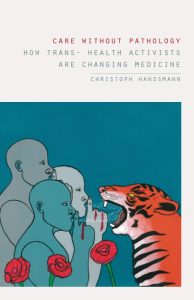In Care Without Pathology: How Trans- Health Activists Are Changing Medicine, Christoph Hanssmann explores the evolution of trans therapeutics and health activism through ethnographic fieldwork conducted in New York City and Buenos Aires. Demonstrating how grassroots movements are disrupting social and biomedical power structures, the book is an essential contribution to research on depathologisation efforts in trans care, writes Robin Skyer.
Care Without Pathology: How Trans- Health Activists Are Changing Medicine. Christoph Hanssmann. University of Minnesota Press. 2023.
 “The moves that would help the most transgender people the most? None of them are transgender specific”. Paisley Currah, praised political scientist and co-founder of the leading journal in trans* studies TSQ: Transgender Studies Quarterly, stated what seems to be a fairly obvious point at a seminar in 2020. Yet, considering the ways in which dominant political and media discourses speak about trans* therapeutics (the term that the author of Care Without Pathology, Christoph Hanssmann, uses to describe the wide variety of gender-affirming care), trans* health, and hence trans* lives, are still considered to be an exception.
“The moves that would help the most transgender people the most? None of them are transgender specific”. Paisley Currah, praised political scientist and co-founder of the leading journal in trans* studies TSQ: Transgender Studies Quarterly, stated what seems to be a fairly obvious point at a seminar in 2020. Yet, considering the ways in which dominant political and media discourses speak about trans* therapeutics (the term that the author of Care Without Pathology, Christoph Hanssmann, uses to describe the wide variety of gender-affirming care), trans* health, and hence trans* lives, are still considered to be an exception.
(Following Marquis Bey, in this article I use “trans*” – with an asterisk – as a disruptive term that perturbs ontological states. Most often, in Anglophone contexts, “trans” is used as an umbrella term to describe individuals whose gender identities expand beyond, subsume, or deny a binary structure. The use of the asterisk frees “trans*-ness” from its corporeal, nominalist ties. Instead, “trans*” becomes a function or expression; one that is neither predetermined nor limited in its scope.)
Hanssmann traces the shifting definition of trans* therapeutics, from 20th century transsexual medicine to contemporary crip, trans*-feminist informed healthcare infrastructures.
In Care Without Pathology, Hanssmann traces the shifting definition of trans* therapeutics, from 20th century transsexual medicine to contemporary crip, trans*-feminist informed healthcare infrastructures. In contrast to gay and lesbian depathologisation, Hanssmann notes, trans* activists and advocates have not looked for a divorce from medicine (as the tools for therapeutic care were, and continue to be, controlled by the state), but for a transformation of biomedical care structures. This is not to say that the movement seeks assimilation with, or inclusion within, current systems, but instead asks: what would it be like to receive the care we ask for, in the way that we need?
Care without pathology […] resists the damaging effects of legal, state, bureaucratic, and financial systems upon pathologised groups
Hanssmann emphasises how issues such as medical gatekeeping and self-determination in care settings are the result of hegemonic power relations; issues that many (multiply-)marginalised groups face in their interaction with biomedical practice. Care without pathology, he argues, calls not only upon a broader change of healthcare infrastructures, but resists the damaging effects of legal, state, bureaucratic, and financial systems upon pathologised groups. As such, trans* health activism has more in common with disability and feminist movements, as they contest hierarchies of power and systemic harm within the constraints of the present.
As an ethnographic study, Care Without Pathology is founded upon eight years of research in Buenos Aires, Argentina, and New York City, USA. Hanssmann argues that by choosing locations in both the Global South and the Global North, he was able to engage in “transhemispheric discursive inquiry” (17), an approach that leans away from a standard comparative study by acknowledging the interactions and relations between research sites. Although I would contest Hanssmann’s use of this oversimplified dichotomy, his choice of locations enables us to explore different contexts in which major changes in the regulation of trans* therapeutics were taking place between 2012 and 2018.
In Argentina, 2012 saw the passing of the Gender Identity Law, which removed the requirement of a diagnosis for trans* therapeutics. In 2013, the publication of the Diagnostic and Statistical Manual (DSM-5) by the American Psychiatric Association removed “Gender Identity Disorder” from their guidelines and included a new diagnostic classification: ‘Gender Dysphoria’, which advocates saw as a positive step toward depathologisation. Hence, Care Without Pathology spans a period of significant transformation, the effects of which are continuing to unfurl. Moreover, Hanssmann draws upon ethnographic observations and interviews, ensuring that the voices of social workers, community members, activists and advocates resonate throughout the book.
Hanssmann draws upon ethnographic observations and interviews, ensuring that the voices of social workers, community members, activists and advocates resonate throughout the book.
Hanssmann describes vivid examples of grassroots activism and its volatile association with political compromise. Chapter Three, for example, focuses upon the use of epidemiological biographies by community-based researchers in Buenos Aires. This involved the combining of biographical data with statistics, creating visuals and information about the effects of violence and discrimination upon the health and lives of travesti and trans* people. Through this method, organisers were able to leverage political focus upon Argentinian state responsibilities for premature deaths, as well as institutionalised neglect and violence with regards to employment, healthcare, and housing. However, as Hanssmann highlights, this use of statistical collectivisation, and the concept of “population”, are closely associated with state power, structural violence, and trans* necropolitics.
[The] use of statistical collectivisation, and the concept of “population”, are closely associated with state power, structural violence, and trans* necropolitics
This is particularly salient for travesti, for whom the subsuming of their livelihoods, identities, and culture under a wider trans* umbrella is colonial oppression. (I urge readers to review the work of Malú Machuca Rose, who writes about travesti and resistance to colonial usage of the word; as well as the works of Giuseppe Campuzano and Miguel A. López.) It is through the discussion of these conflicting ideas that Care Without Pathology deftly illustrates the complexity of struggles for change.
Another example is outlined in Chapter Four, where Hanssmann describes the “narrow passageways of action” (149) used to contest Medicaid exclusion. Activists and advocates pressed for access to trans* therapeutics by using the language of state authorities that spoke predominantly of economic risk. They highlighted the negative effects of austerity measures and reframed the narrative around trans* therapeutics as a public good. Nevertheless, as Hanssmann explains, by utilising a method that draws upon human capital and the politics of investment, one may ask whether more harm may be caused (or left to fester), through an adherence to these neoliberal conceptions. It seems antithetical to use economic value as a measure for the “worthiness” of lives, when coalitional social change is what you are striving for.
What happens when trans* people seek to distance themselves from biomedical and state institutions, and find self-supporting solutions?
Hanssmann acknowledges that there has been a narrative shift from trans* health to trans* wellness, a change that reflects depathologisation efforts. He also mentions the work of scholars such as Cameron Awkward-Rich, Hil Malatino, and Andrea Long Chu, who highlight the constitutive pain and negativity of trans*-ness as a counter to “curative” discourse surrounding trans* therapeutics. Yet what could expand upon Hanssmann’s work is an exploration of self-procurement and therapeutic experimentation. What happens when trans* people seek to distance themselves from biomedical and state institutions, and find self-supporting solutions? Consequently, we may ask whether the term “trans* therapeutics” is appropriate to describe trans* care practices. It is in this area that my own PhD research is situated. My current research approaches the topic of trans* care through qualitative, participatory techniques and looks to complement Hanssmann’s analysis.
Where Care Without Pathology succeeds is through the presentation of trans* activisms that have acknowledged the epistemological ties between groups and individuals that are labelled as “an exception”. By demonstrating how the politics of difference creates harm through biomedical structures and other systems of power, Hanssmann highlights the need for coalitional activism in the struggle for social change, and as resistance to neocolonialism. It is an excellent addition to the reading lists of scholars, activists, and indeed, anyone interested in social movements, queer studies and the sociology of care.
This post gives the views of the author, and not the position of the LSE Review of Books blog, or of the London School of Economics and Political Science. The LSE RB blog may receive a small commission if you choose to make a purchase through the above Amazon affiliate link. This is entirely independent of the coverage of the book on LSE Review of Books.
Image Credit: Ross Burgess on Wikimedia Commons.







